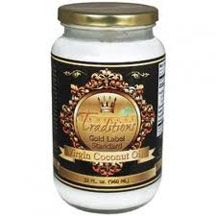Give Coconut Oil a Chance!
By Alice Osborne
 Coconut oil has been given a bad rap in the past, but new and accurate research is proving it to be another healthy saturated fat. It contains many beneficial properties - so many in fact, that it definitely deserves a place in the diet - especially the diet of the insulin resistant.
Coconut oil has been given a bad rap in the past, but new and accurate research is proving it to be another healthy saturated fat. It contains many beneficial properties - so many in fact, that it definitely deserves a place in the diet - especially the diet of the insulin resistant.
The fat in coconut oil is easily digested and absorbed, unlike the man-made fats or oils that act just like plastic in the body. It puts very little strain on the digestive system and provides a quick source of energy necessary to promote healing.
Here are some other very interesting facts about Coconut Oil from CoconutResearchCenter.org:
 It supports immune system function.
It supports immune system function.
 It supplies important nutrients necessary for good health--fiber, vitamins, and minerals. And it is classified as a "functional food" because it provides many health benefits beyond its nutritional content.
It supplies important nutrients necessary for good health--fiber, vitamins, and minerals. And it is classified as a "functional food" because it provides many health benefits beyond its nutritional content.
What makes it different from all other oils, especially other saturated fats?
The difference is in the fat molecule. All fats and oils are composed of molecules called fatty acids. There are two methods of classifying fatty acids. The first you are probably familiar with is based on saturation. You have saturated fats, monounsaturated fats, and polyunsaturated fats.
Another system of classification is based on molecular size or length of the carbon chain within each fatty acid. Fatty acids consist of long chains of carbon atoms with hydrogen atoms attached. In this system you have short-chain fatty acids (SCFA), medium-chain fatty acids (MCFA), and long-chain fatty acids (LCFA). Coconut oil is composed predominately of medium-chain fatty acids (MCFA), also known as medium-chain triglycerides (MCT). MCFA help to lower the risk of both atherosclerosis and heart disease. It is primarily due to the MCFA in coconut oil that makes it so special and so beneficial.
 Improves digestion and the absorption of nutrients from proteins and carbohydrates.
Improves digestion and the absorption of nutrients from proteins and carbohydrates.
 Reduces our need for Vitamin E.
Reduces our need for Vitamin E.
 Helps the body get rid of toxins and heavy metals (it's a powerful antioxidant).
Helps the body get rid of toxins and heavy metals (it's a powerful antioxidant).
 Restores, repairs skin, and moisturizes skin; helps reduce chronic skin inflammation, i.e. rosacea, psoriasis, eczema, etc.; soothes and heals.
Restores, repairs skin, and moisturizes skin; helps reduce chronic skin inflammation, i.e. rosacea, psoriasis, eczema, etc.; soothes and heals.
 Conditions and softens hair; conditions the scalp and controls dandruff or cradle cap (caused by yeast/candida overgrowth).
Conditions and softens hair; conditions the scalp and controls dandruff or cradle cap (caused by yeast/candida overgrowth).
 Prevents fungal and bacterial infections due to its antiseptic fatty acids (when it is consumed or applied to the skin).
Prevents fungal and bacterial infections due to its antiseptic fatty acids (when it is consumed or applied to the skin).
 Supports the acid layer on the skin; acts as a barrier to infectious organisms. This is why sweat and the oil produced on our skin are good for us. Taking fewer showers and baths is advisable because it allows the skin to build up natural oils, which forms a good acidic protective barrier, and also helps the skin make vitamin D when exposed to the sun.
Supports the acid layer on the skin; acts as a barrier to infectious organisms. This is why sweat and the oil produced on our skin are good for us. Taking fewer showers and baths is advisable because it allows the skin to build up natural oils, which forms a good acidic protective barrier, and also helps the skin make vitamin D when exposed to the sun.
Soap washes off the protective layer of oil and acid on our skin. After a shower or bath apply coconut oil to the entire body to quickly re-establish the skin's natural antimicrobial and acid barrier.
 Buy a good quality coconut oil that is:
Buy a good quality coconut oil that is:
• Cold- or Expeller- pressed
• Unrefined
• Unbleached
• Un-deodorized
Coconut oil is highly resistant to spoilage and has a long shelf life (2 years at room temperature), so it is not kept refrigerated. It is kept in the cupboard or on the kitchen counter. Like other saturated fats coconut oil goes solid when cooled below room temperature, and in warm weather it will be totally liquid.
Coconut oil has a high burning point making it perfect for cooking. It can be used alone, or mixed with butter, lard or other good fats for cooking and frying.
 Coconut oil can be taken by the spoonfuls with meals to aid digestion or melted on cooked foods. The recommended therapeutic dose for anyone who is unhealthy is 5-6 tablespoons per day, taken in divided doses preferably with meals that contain protein.
Coconut oil can be taken by the spoonfuls with meals to aid digestion or melted on cooked foods. The recommended therapeutic dose for anyone who is unhealthy is 5-6 tablespoons per day, taken in divided doses preferably with meals that contain protein.
Since coconut oil is antifungal, anti-parasitic, antibacterial and anti-viral, etc. it will create die-off or healing reactions in people who are unhealthy, but it will be particularly pronounced in candida sufferers and in people who have viruses and bacteria.
The most common healing reactions are nausea or stomach upset, and diarrhea. This is because coconut oil kills bacteria, yeasts, viruses and parasites in the digestive system and it cleans out toxins.
Diarrhea is the body's way of getting rid of unwanted guests and toxins. Other healing reactions may include increased mucus in the intestines, nose, sinuses, lungs, as well as rashes and other skin eruptions.
 To minimize healing reactions or die-off symptoms start taking coconut oil at a low dose (1/2 to 1 teaspoon 3 times a day) and gradually increase the amount every 4-5 days until the maximum therapeutic dose of 5-6 tablespoons per day is reached.
To minimize healing reactions or die-off symptoms start taking coconut oil at a low dose (1/2 to 1 teaspoon 3 times a day) and gradually increase the amount every 4-5 days until the maximum therapeutic dose of 5-6 tablespoons per day is reached.
It is also important to take coconut oil in divided doses during the day and not all at once. Healthy people can take a maintenance dose of coconut oil which is 3 tablespoons per day. But it's easy to insert it into the diet - you can bake, cook, and fry with it. I use it to make my popcorn. And it's delicious mixed into my morning green smoothie. This is a fat we want in our diet, so give it a chance!

